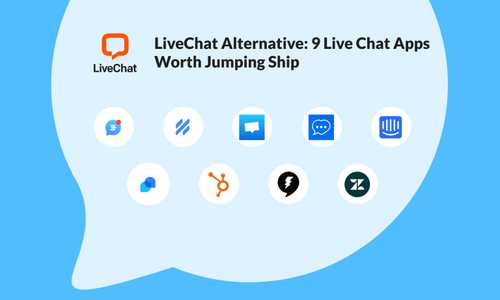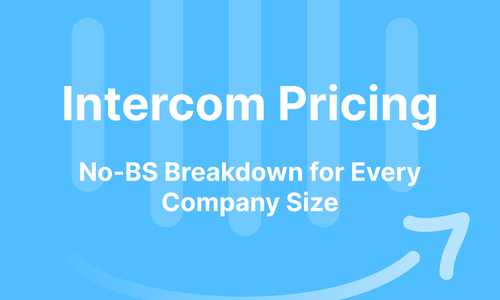If you’re here, it’s safe to assume that you’re looking for a new customer service solution to support your teams and delight your audience. As two of the giants of the industry, it’s only natural that you’d reach a point where you’re comparing Zendesk vs Intercom.
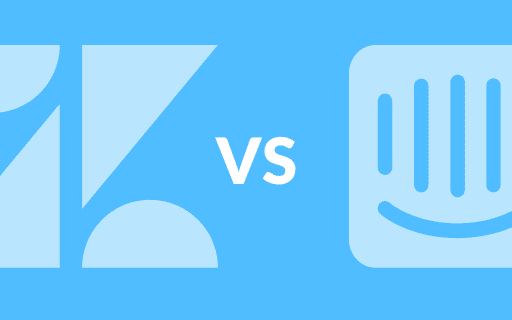
Certainly, these two are leaders in the customer service field for a reason (more on that later).
However, after patting yourself on the back, you now realize you’re faced with the daunting task of choosing between the two. With so many features to consider, not to mention pricing, user experience, and scalability, we don’t blame you if you feel your head spinning.
While both Zendesk and Intercom offer the essentials, like ticketing, issue resolution, and automation, the devil’s in the details when it comes to which is best for your unique needs.
Fear not—we’re here to help you make the smart choice for your business with an unbiased comparison. As industry-insiders, we’ll give you the inside scoop on the most important differences, similarities, and some factors you may not even have thought of yet!
Zendesk profile
Zendesk is a customer service platform that was launched in 2007. It started as a ticketing tool just for customer service teams and has evolved over the years into a complete customer support platform. Since, its name has become somewhat synonymous with customer service and support.
As per G2, Zendesk has a 4.3-star rating from nearly 6,000 reviews. Most users highlight its ease of use as a key strength, as well as its robust customer service tools and helpful support. However, some lament its lack of sales and CRM tools (if you don’t subscribe to Zendesk Sell).
Zendesk’s specialty is still its robust ticketing system. Today, amid the rise of omnichannel customer service, it offers a centralized location to manage interactions via email, live chat, social media, or voice calls.
In the process, it streamlines collaboration between team members as well as a unified interface to manage all help resources.
One of Zendesk’s other key strengths has also been its massive library of integrations. It works seamlessly with over 1,000 business tools, like Salesforce, Slack, and Shopify. With its features and pricing, Zendesk is geared toward businesses that full in the range from mid-sized to enterprise-level.
Some top Zendesk alternatives:
- Freshdesk: Offers similar features to Zendesk, but focuses more on reaching smaller businesses with affordable pricing and a user-centric design.
- HubSpot Service Hub: Has some of the best automation and reporting tools, and is a convenient option for companies that already use Hubspot CRM.
- Help Scout: Provides a simple user interface that’s easy to pick up without any extra training, and brings a personalized approach to customer outreach.
Intercom profile
Having only appeared in 2011, Intercom lacks a few years of experience on Zendesk. It also made its name as a messaging-first platform for fostering personalized conversational experiences for customers.
According to G2, Intercom has a slight edge over Zendesk with a 4.5-star rating, but from just half the number of users. Similar to Zendesk, though, users praise its ease of use and feature set. While no area of concern really stands out, there are some complaints about the company’s billing practices.
While its integrations are not as far-reaching as Zendesk’s, it seamlessly works with modern communication and business tools, like WhatsApp and the most prominent CRMS. Not to mention marketing and sales tools, like Salesforce, Hubspot, and Google Analytics.
As the more recent of the two, offering a modern look-and-feel and frictionless experience is a key magnet for Intercom. It effortlessly brings together in-app chat, automated chatbots, and a unified inquiry inbox in its help center.
Today, Intercom is a favorite among SaaS companies, startups, and customer-centric business alike.
Some top Intercom alternatives:
- Drift: A strong contender in conversational marketing and sales, focusing on real-time customer engagement. Although very similar, there are still key differences when comparing Drift and Intercom.
- Freshchat: Offers robust messaging features tailored to businesses looking for cost-effective customer communications.
- LiveChat: Known for its simplicity and ease of use, making it popular among small businesses.
Zendesk vs Intercom: What are the real differences?
Ticketing & Automation
Traditional ticketing systems are one of the major customer service bottlenecks companies want to solve with automation. Intelligent automated ticketing helps streamline customer service management and handling inquiries while reducing manual work.
While both Zendesk and Intercom offer strong ticketing systems, they differ in the depth of automation capabilities.
Zendesk Automation
Zendesk’s automation is centered around streamlining ticket management by bringing together customer inquiries from various sources—email, phone, web, chat, and social media—into a single platform.
It makes sure that you don’t miss a single inquiry by queuing tickets for agent handling. You can configure it to assign tickets using various methods, such as skills, load balancing, and round-robin to ensure efficient handling.
Your customer service agents are always kept in the loop thanks to real-time communications and in-app notifications, Plus, convenient yet powerful, triggers, macros, and automation rules let you intelligently route tickets, set statuses, and automate routine tasks with minimal upfront effort.
That being said, you need to put in more work initially to get the most out of its automation compared to others.
Intercom Automation
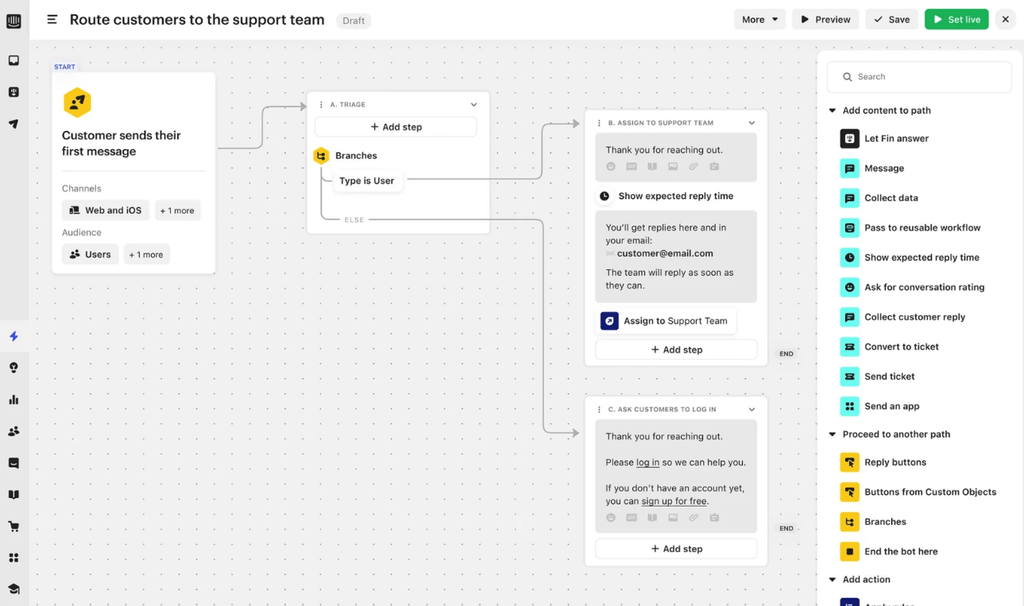
On the other hand, Intercom’s ticketing automation excels at improving customer engagement. The platform collects requests from multiple channels — social media, emails, instant messaging, in-app support, and phone calls — and routes them intelligently to your agents.
Furthermore, Intercom offers advanced automation features such as custom inbox rules, targeted messaging, and dynamic triggers based on customer segments.
While most of Intercom’s ticketing features come with all plans, it’s most important AI features come at a higher cost, including its automated workflows.
Chatbot & Customer communication
Chatbots are becoming the cornerstone of AI customer service.
Far from impersonalizing customer service, chatbots offer an immediate and efficient way to address common queries that end in satisfaction. Nowadays, it’s a crucial component in helping businesses focus on high-priority interactions and scale their customer service.
When comparing chatbots, it’s important to consider their level of intelligence, “trainability,” and customization.
Zendesk Chatbot
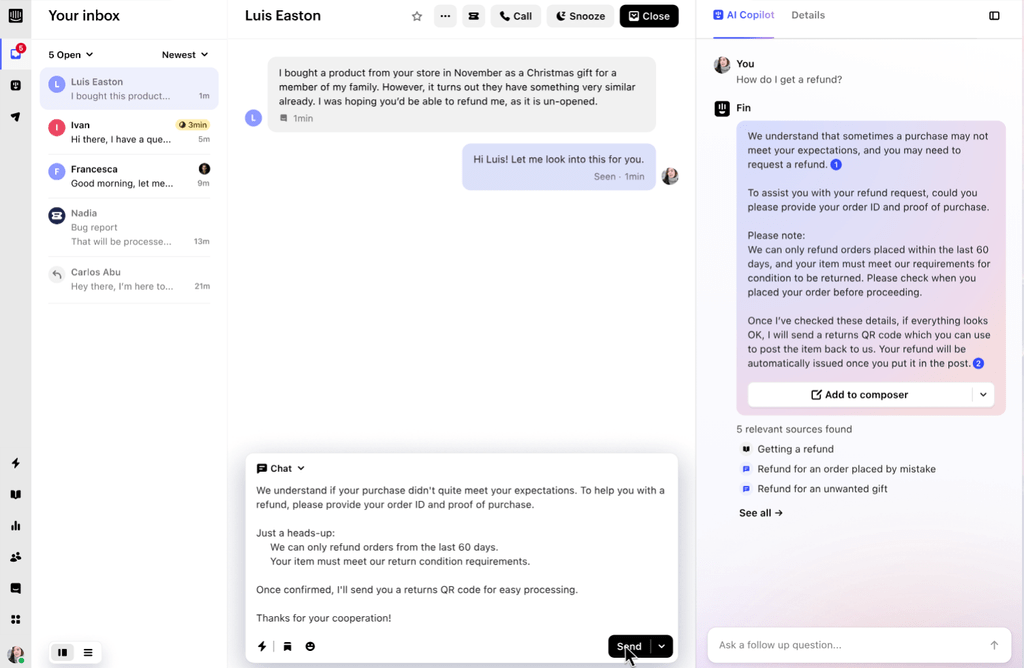
Zendesk’s Answer Bot is capable of helping customers with common queries by providing canned responses and links to relevant help articles. It relies on fairly basic automation while routing more complex issues to live agents.
That being said, it sometimes lacks the advanced customization and automation offered by other AI-powered chatbots, like Intercom’s.
However, you won’t miss out on any of the essentials when it comes to live chat. Automated triggers, saved responses, and live chat analytics are all baked in. The only other downside is that the chat widget can feel a bit static and outdated.
Intercom Chatbot
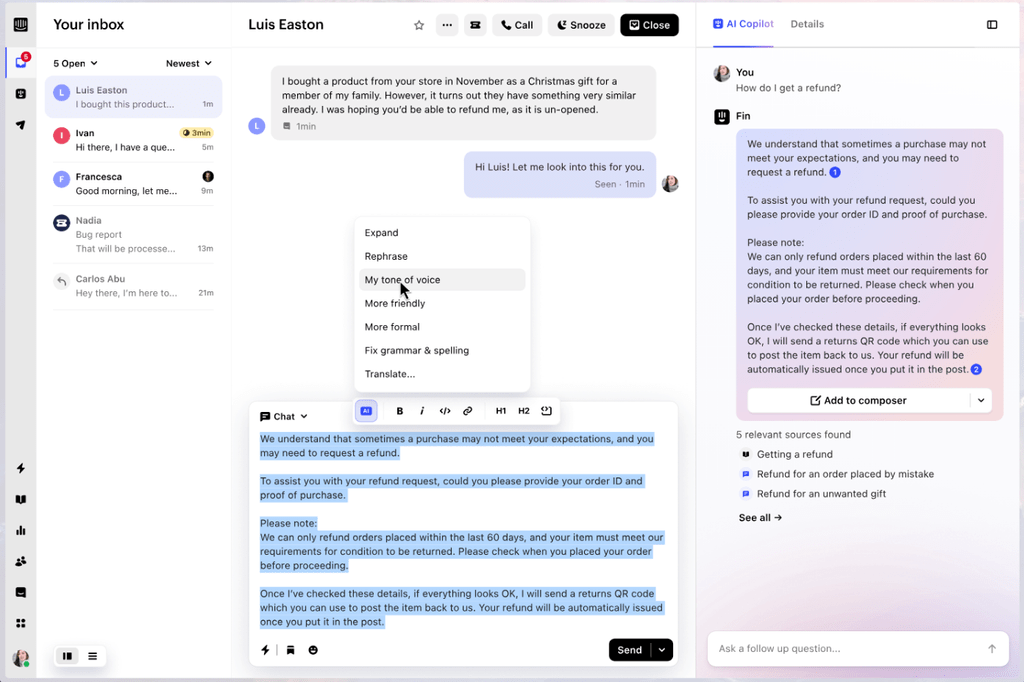
Right off the bat, Intercom’s Chatbot is more advanced and customizable. If you prioritize seamless, personalized customer interactions, it’s arguably the better option of the two.
Powered by AI, Intercom’s Fin chatbot is purportedly capable of solving 50% of all queries autonomously — in multiple languages. At the same time, Fin AI Copilot background support to agents, acting as a personal, real-time AI assistant for dealing with inquiries.
Plus, Intercom’s modern, smooth interface provides a comfortable environment for agents to work in. It even has some unique features, like office hours, real-time user profiles, and a high-degree of customization.
Helpdesk
As the place where your agents will be spending most of their time, a functional and robust Helpdesk will be critical to their overall performance and experience. While there are some universal things to look out for, like the range of features, ease of use, and a seamless omnichannel experience, it’s also about your subjective experience. While both Zendesk and Intercom tick both those boxes, they each have their own distinct style.
Zendesk Helpdesk

Zendesk’s helpdesk experience is built around two primary pillars: ticketing and collaboration.
After all, Zendesk is a ticketing system first and foremost. It’s built for function over form — the layout is highly organized and clearly designed around ticket management. You get an immediate overview of key metrics, such as ticket volume and agent performance as well as a summary of key customer data points.
This organization is important because it brings together customer interactions from all channels in this one place. And, Zendesk is nothing if not geared for helping agents deal with large ticket volumes efficiently.
Agents experienced with a helpdesk might feel right at home, but it can be overwhelming for others. Plus, the design could do with a modern overhaul.
That being said, Zendesk does provide themes and customization options to tailor your dashboard. Some options include adding FAQs, announcements, and guides to help customers help themselves.
Intercom Helpdesk
Unlike Zendesk, Intercom’s helpdesk feels a little more like a modern messaging app and a little less like a stuffy support dashboard. It has a clean and intuitive design that prioritizes user engagement, and certainly wins the beauty contest between the two.
It’s definitely something that both your agents and customers will feel equally comfortable using.
The dashboard follows a streamlined approach with a single inbox for customer inquiries. Here, agents can deal with customers directly, leave notes for each other to enable seamless handovers, or convert tickets into self-help resources.
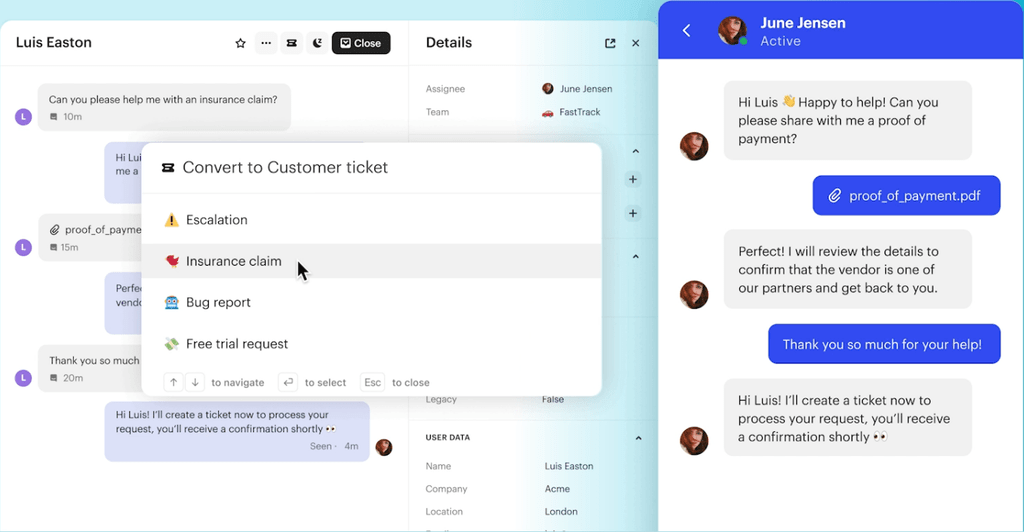
While clutter-free and straightforward, it does lack some of the more advanced features and capabilities that Zendesk has.
Reporting
When it’s intelligent and accessible, reporting can provide deep insights into your customer interactions, agent efficiency, and service quality at a glance. Zendesk’s reporting tools are arguably more advanced while Intercom is designed for simplicity and ease of use. Zendesk also prioritizes operational metrics, while Intercom focuses on behavior and engagement.
Zendesk Reporting
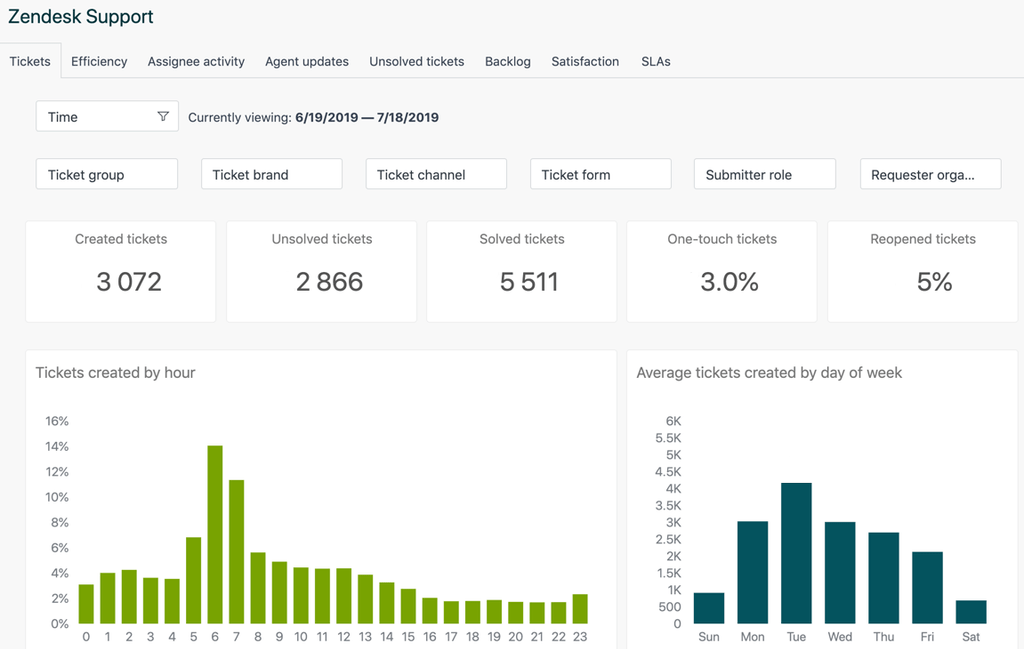
If you want to get to the nitty-gritty of your customer service team’s performance, Zendesk is the way to go. Zendesk Explore lets you take a deep-dive into how various aspects of your support operations function according to ticket volume, agent performance, customer satisfaction, first-contact resolution rates, and much, much more.
It goes without saying that you can generate custom reports to hone in on particular areas of interest. Whether you’re into traditional bar charts, pie charts, treemaps, word clouds, or any other type of visualization, Zendesk is a data “nerd’s” dream.
Plus, with its focus on collaboration, Zendesk also makes sharing reports on a one-off or recurring basis a breeze.
Intercom Reporting
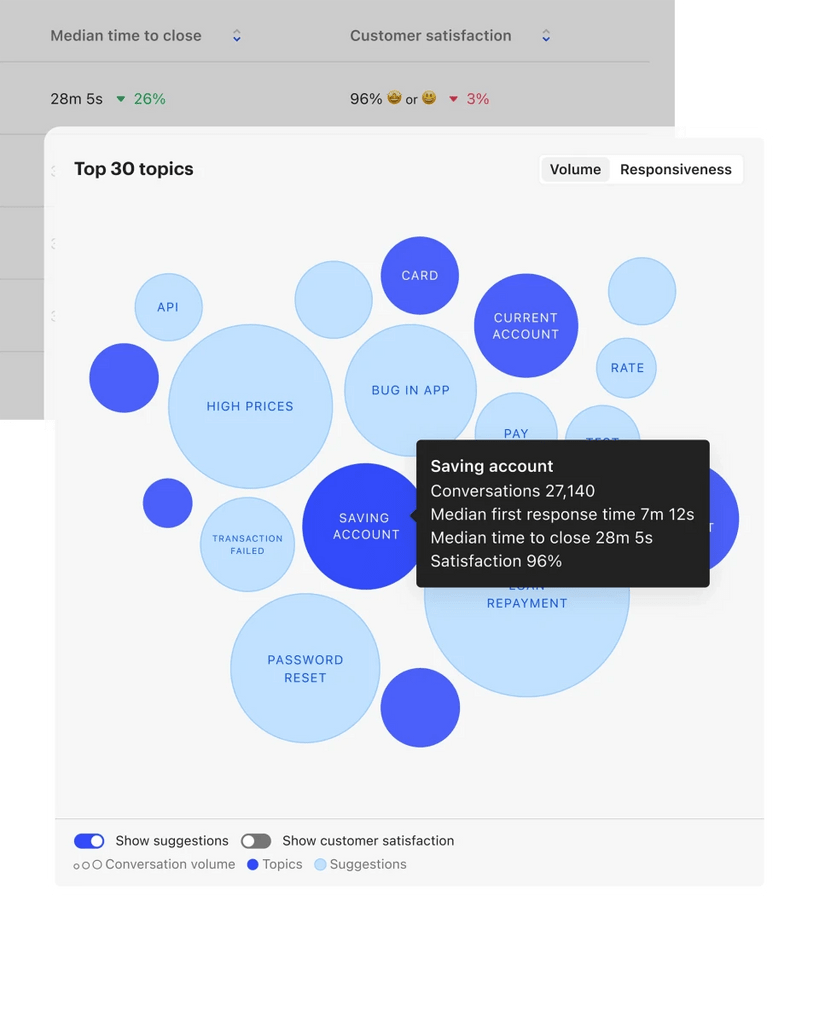
Intercom’s reporting is less focused on getting a fine-grained understanding of your team’s performance, and more on a nuanced understanding of customer behavior and engagement.
You’ll still be able to get your eyes on basic support metrics, like response times and bot performance, that will help you improve your service quality. However, Intercom’s real strength lies in generating insights into areas like customer journey mapping, product performance, and retention.
With this data, businesses identify friction points where the customer journey breaks down as well as areas where it’s performing smoothly.
What’s even cooler is its ability to use AI to forecast customer behavior. Agents can use this to anticipate and proactively address issues before the escalate, or even arise in the first place.
CRM
Customer Relationship Management (CRM) has become indispensable for businesses to manage their customer relations. A worthwhile customer service tool should either offer CRM capabilities built-in or seamlessly integrate with your existing solution. Just like before, Zendesk and Intercom have taken very different approaches to CRM:
Zendesk CRM
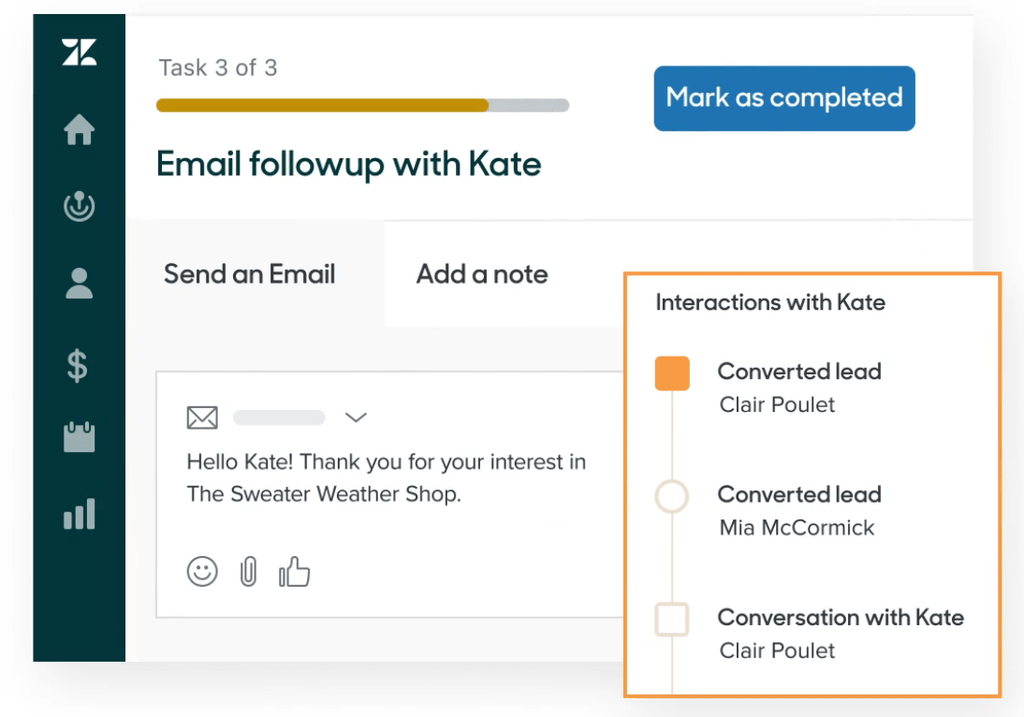
While not included with its customer service suite, it offers a full-fledged standalone CRM called Zendesk Sell. While it’s a separate product with separate costs, it does integrate seamlessly with Zendesk’s customer service platform.
Zendesk Sell provides robust CRM features such as lead tracking, task management, and workflow automation. Not to mention its advanced reporting capabilities, customizable dashboards, and seamless mobile app experience for an always-on approach to service.
As the name suggests, it’s a more sales-oriented solution with robust contact and deal management tools as well.
This makes Zendesk a strong choice for businesses that need a powerful CRM integrated with their customer support platform, although it does require an additional investment.
Intercom CRM
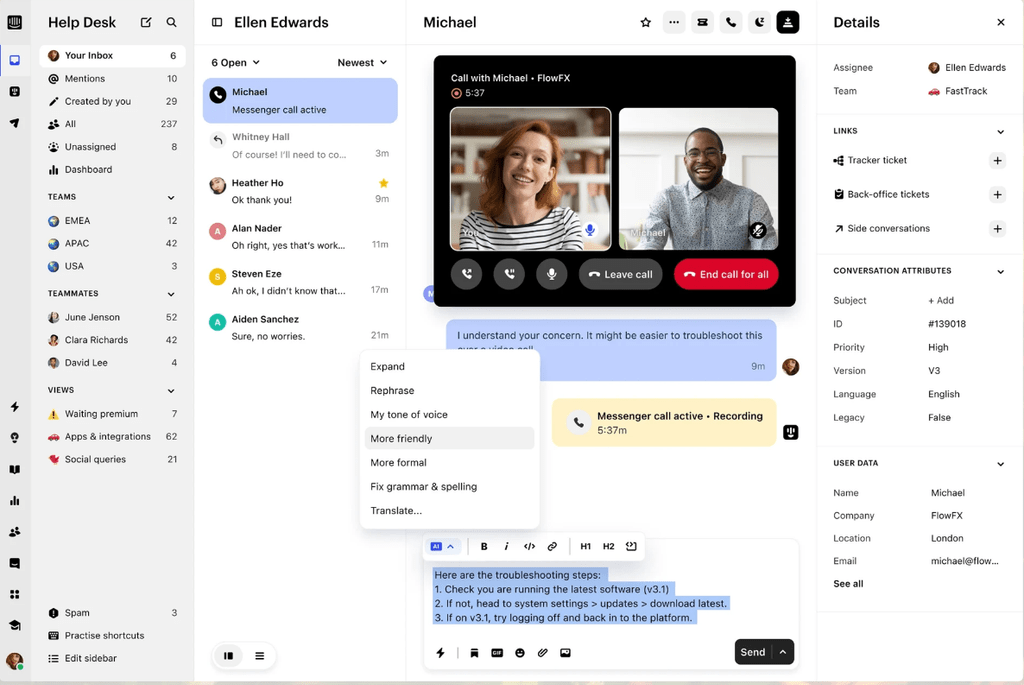
Intercom is a customer-focused communication platform with basic CRM capabilities. While we wouldn’t call it a full-fledged CRM, it should be capable enough for smaller businesses that want a simple and streamlined CRM without the additional expenses or complexity.
Intercom’s CRM features include customer journey tracking, custom data parameters, and list segmentation, which are useful for targeted marketing and engagement. You can use these features to create custom funnels, segment users based on specific behaviors, and automate personalized communications.
However, for more advanced CRM needs like lead management and sales forecasting, Intercom may not make the cut, unfortunately.
Pricing
Zendesk and Intercom’s pricing shares many similarities. They fall within roughly the same price range, that most SMEs and larger enterprises should find within their budget. Both also use a two-pronged pricing system, based on the number of agents/seats and the level of features needed.
Either way, you can also take advantage of a 14-day trial to test out the service.
However, they do differ in some key ways. Zendesk offers a slightly broader selection of plans, with an enterprise solution for customers with bespoke needs.
Zendesk Pricing
Most businesses will be interested in Zendesk’s “all-in-one solutions,” which offer the most complete experience. These are:
- Suite Team: $55/agent/month (billed annually)
- Ticketing system
- AI agents
- Pre-defined responses
- 1,000+ integrations
- Omnichannel messaging
- Custom business rules
- Suite Growth: $89/agent/month (billed annually)
- Everything in Team, plus
- Customizable ticket forms
- SLAs
- CSAT
- Multilingual support
- Customer service portals
- Suite Professional: $155/agent/month (billed annually)
- Everything in Growth, plus
- Custom and live analytics
- Side conversations
- Skill-based routing
- Suite Enterprise: Custom
- Sandbox
- AI-powered content cues
- Custom agent roles
- Dynamic, contextual workspaces
However, Zendesk recently also released a “build your own” plan aimed at small businesses, starting at a budget-friendly $19/month, it offers the essentials, such as a ticketing system, social integration, customer profiles, business rules, and AI agents.
You can then add features like advanced AI agents, workforce management, and QA. However, at $25-$50/agent/month, these are quite pricey.
Intercom Pricing
Similar to Zendesk, Intercom’s pricing reserves its most powerful automations for higher-paying customers, the good news is that Fin AI comes with all plans.
- Essential: $29/agent/month (billed annually)
- Shared inbox
- Basic chatbots
- AI compose
- Ticketing
- Help Center
- Advanced: $85/agent/month (billed annually)
- Everything in Essential, plus
- Multiple team inboxes
- Advanced workflow automations
- Expert: $132/agent/month (billed annually)
- Everything in Advanced, plus
- Workload management
- Multiple help centers
Just keep in mind that, while Intercom’s upfront pricing may seem cheaper, there are additional costs to factor in. When factoring in AI-first tools for all agents, multi-channel campaigns, and proactive support, it could easily cost significantly more than Zendesk.
An alternative to Zendesk and Intercom that is future-oriented: discover Customerly
Customerly is a forward-thinking, all-in-one customer service platform.
Not to brag 😏, but we specifically developed our platform to address the shortcomings in the current market. By going with Customerly for your customer service needs, you can get the best of both worlds (Zendesk and Intercom), plus some extra features and benefits you haven’t even thought of, yet.
With that in mind, let’s see how Customerly compares to both Zendesk vs Intercom:
Customerly Ticketing & Automation
To make your ticket handling a breeze, Customerly offers an intuitive, all-in-one platform that consolidates customer inquiries from various channels into a unified inbox.
Unlike Zendesk, which requires more initial setup for advanced automation, Customerly’s out-of-the-box automation features are designed to be user-friendly and easily customizable.
While it may not have Intercom’s extensive customization options, Customerly fills the gap by providing efficient, intelligent ticket routing and automated workflows that reduce manual effort without sacrificing functionality.
If you want a balance between ease of use and powerful automation, Customerly should be your go-to.
Customerly Chatbot
Simply put, we believe that our Aura AI chatbot is a game-changer when it comes to automating your customer service. Try it out, and we guarantee that you’ll feel the same way.
Aura AI transcends the limits of traditional chatbots that typically struggle with anything but the simplest user queries. Instead, Aura AI continuously learns from your knowledge base and canned responses, growing and learning — just like a real-life agent.
Your agents will love the seamless assistance Aura AI provides throughout the entire customer interaction. From handling multiple questions to avoiding dreaded customer-stuck loops, Aura AI is the Swiss Army Knife of customer service chatbots.
Plus, by defining missions for our AI chatbot, you can ensure that it stays on task with your customer service goals.
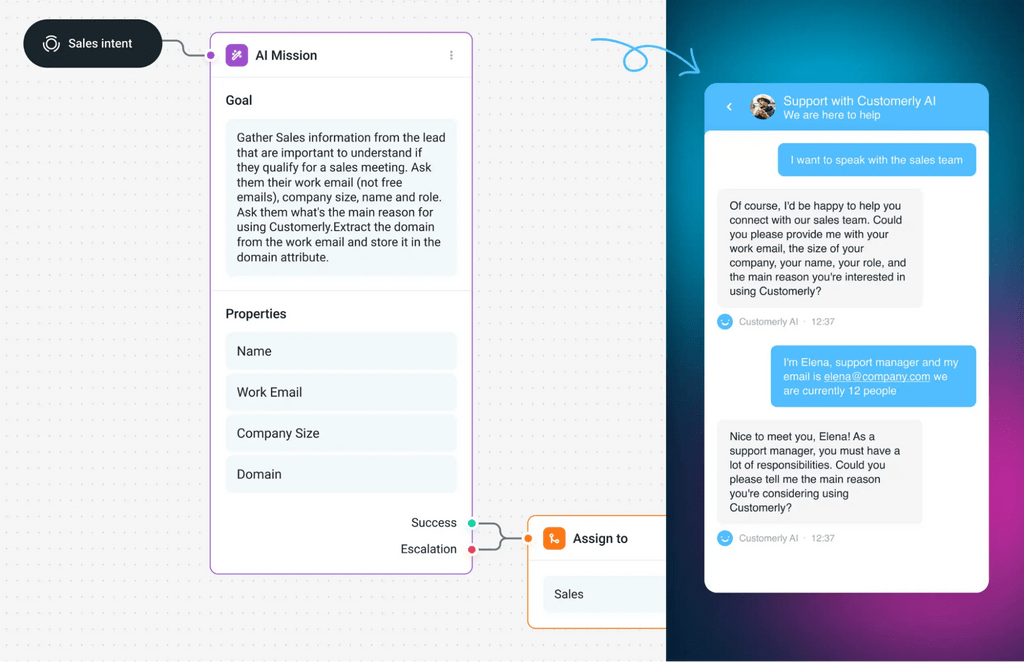
Aura AI also excels in simplifying complex tasks by collecting data conversationally and automating intricate processes. When things get tricky, Aura AI smartly escalates the conversation to a human agent, ensuring that no customer is left frustrated. Plus, Aura AI’s global, multilingual support breaks down language barriers, making it an ideal solution for businesses with an international customer base.
Whether you’re looking to provide instant, personalized responses or streamline customer interactions, Customerly’s Aura AI offers an intelligent, scalable, and satisfying solution that stands out in the crowded chatbot landscape.
Customerly Helpdesk
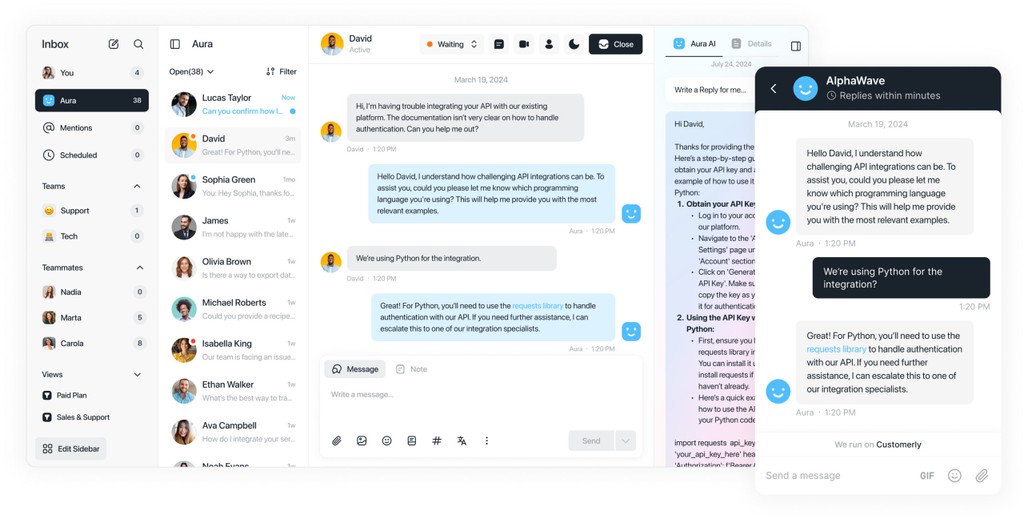
At first glance, you can see that Customerly’s Helpdesk balances the power of Zendesk with the modern and flowing UI of Intercom
Customerly’s Helpdesk is designed to boost efficiency and collaboration with the help of AI. Agents can easily view ongoing interactions, and take over from Aura AI at any moment if they feel intervention is needed. Our AI also accelerates query resolution by intelligently routing tickets and providing contextual information to agents in real-time.
It also provides seamless navigation between a unified inbox, teams, and customer interactions, while putting all the most important information right at your fingertips. This makes it easy for teams to prioritize tasks, stay aligned, and deliver superior service.
What’s more, we support live video support for moments when your customers need in-depth guidance.
Customerly Reporting
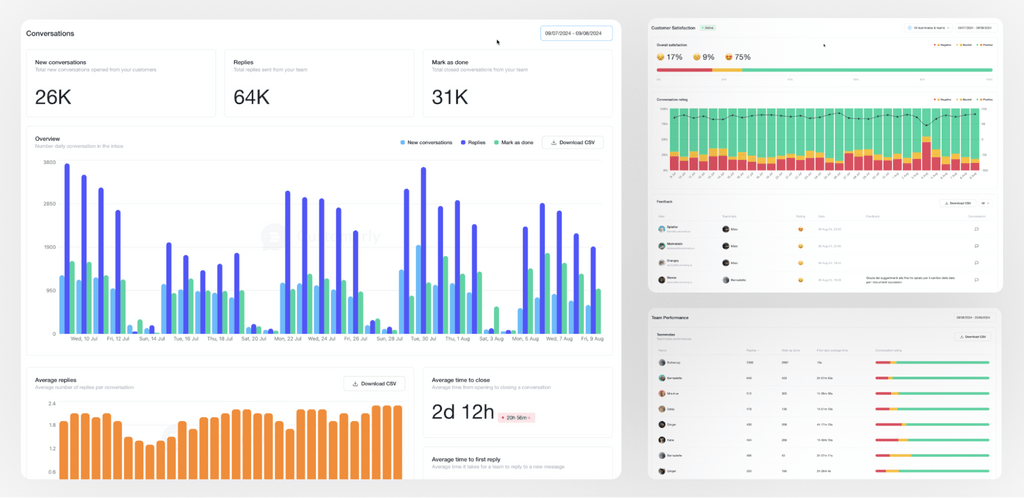
Customerly’s reporting tools are built on the principle that you can’t improve what you can’t measure.
Our platform offers comprehensive reports across various aspects of your customer service operations, helping your teams learn and grow:
- Chat Reports: Provides insights into daily workloads, tracking how many conversations your team handles and how efficiently they resolve them.
- Agent Reports: Lets you monitor individual performance, so you can proactively identify areas to improve.
- Help Center Reports: Allows you to assess and improve your knowledge base, ensuring they meet customer needs.
- Failed Search Reports: Highlights gaps in your help center, showing what customers are searching for but not finding.
Customerly’s reporting suite also includes tools for running customer satisfaction (CSAT) and Net Promoter Score (NPS) surveys, giving you a clear picture of customer sentiment and areas for product improvement.
Customerly CRM
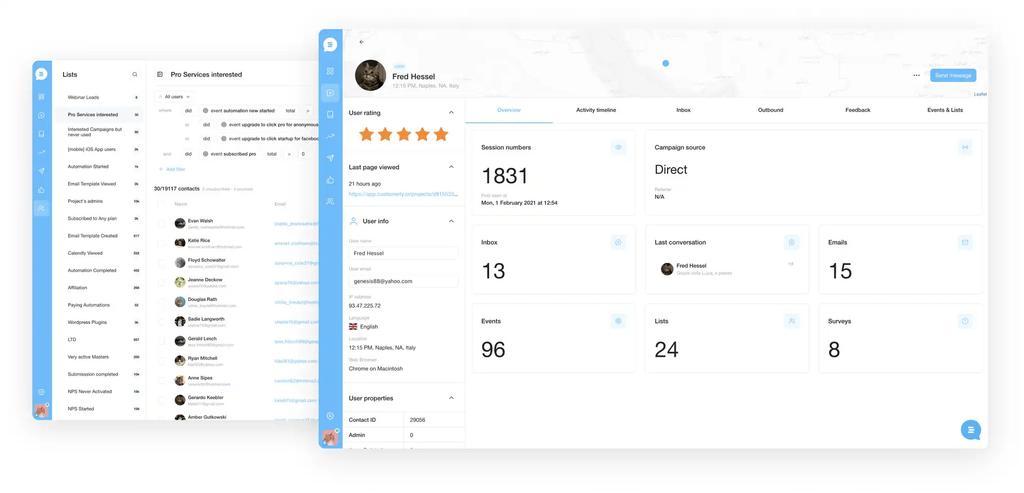
Customerly’s CRM is designed to help businesses build stronger relationships by keeping customer data organized and actionable.
Unlike Zendesk, which requires a separate CRM tool, and Intercom, which offers only basic CRM functionality, Customerly integrates a fully-featured CRM directly into our platform, making it easy to manage customer interactions without switching between tools.
You can access detailed customer data at a glance while chatting, enabling you to make informed decisions in real time. The customer journey timeline provides a clear view of customer activities, helping you understand behaviors and tailor your responses accordingly.
Customerly allows you to rate prospects, either manually or automatically, so you can prioritize the most valuable leads. Our platform also supports dynamic list building, enabling you to run targeted surveys, send newsletters, and automate marketing actions, all from one place.
Customerly Pricing
We also offer transparent, what-you-see-is-what-you-get pricing. Choose a plan based on the features you want, and then scale it according to the seats, emails, and AI usage you need. Your first few seats are always on us!
- Essential: $9/month
- Includes 3 seats and 1,000 interactions
- Live chat
- Team inboxes
- Help Center
- Startup: $49/month
- Includes 6 seats ($10 extra per month per seat) and 10,000 interactions
- AI features
- AI training
- Chat flows
- In-Chat Help center
- Pro: $99/month
- Includes 10 seats ($15 extra per month per seat) and 20,000 interactions
- Video chat
- Smart assign
- Enterprise: $299/month
- Includes 15 seats ($30 extra per month per seat) and 50,000 interactions
- Multi-lingual support
- Team insights
- CSAT
You also don’t have to take our word for it. You can try Customerly without any risk to you as we offer a 14-day free trial.
Zendesk vs Intercom: all the functionalities in a glance
Is your head still spinning? Don’t worry — we know that there’s a lot of information to take in. If you need a quick refresher, here’s a table summarizing the key differences between Zendesk and Intercom:
| Zendesk | Intercom | |
| Free trial / free plan | 14-day free trial / no free plan | 14-day free trial / no free plan |
| Pricing | Starts at $55/agent/month | Starts at $29/agent/month |
| Ticketing & Automation | 4/5 – Excellent and robust ticketing, but automation needs some manual setup | 5/5 – Similar ticketing capabilities, but more out-of-the-box automation |
| Chatbot & AI Customer service | 4/5 – Basic and effective chatbots that can handle simple queries | 5/5 – More advanced AI-powered chatbots that are easier to train and customize |
| Helpdesk | 4/5 – Feature-rich, but less modern and user-friendly | 4/5 – Intuitive and sleek, but with fewer capabilities |
| Reporting | 5/5 – Advanced and highly customizable reporting | 4/5 – Less advanced with a focus on customer engagement |
| CRM | 3/5 – Powerful CRM, but needs separate subscription | 4/5 – CRM included, but fairly basic |
| Cost | 4/5 – Slightly pricer, but more transparent and comprehensive | 4/5 – More affordable, but many potential addons |
Zendesk vs Intercom: Which one should you choose?
Let’s get one thing straight right away — you can’t go entirely wrong with either Zendesk or Intercom.
As long as you choose a plan that’s within your budget, both offer all the basics you need from assisted AI customer service to a collaborative help center. Choosing between Zendesk vs Intercom largely comes down to your business needs…
If you require a robust helpdesk with powerful ticketing and reporting features, Zendesk is the better choice, particularly for complex support queries.
On the other hand, Intercom excels in sales automation and customer engagement, making it ideal for sales-oriented businesses.
That being said, while both platforms offer extensive features, they can be costly, especially for smaller enterprises. Ultimately, your choice should reflect whether your priority is comprehensive customer support (Zendesk) or a blend of CRM and sales support (Intercom).
Explore an alternative that combines the best of both worlds. Try Customerly for free for 14 days right now!
